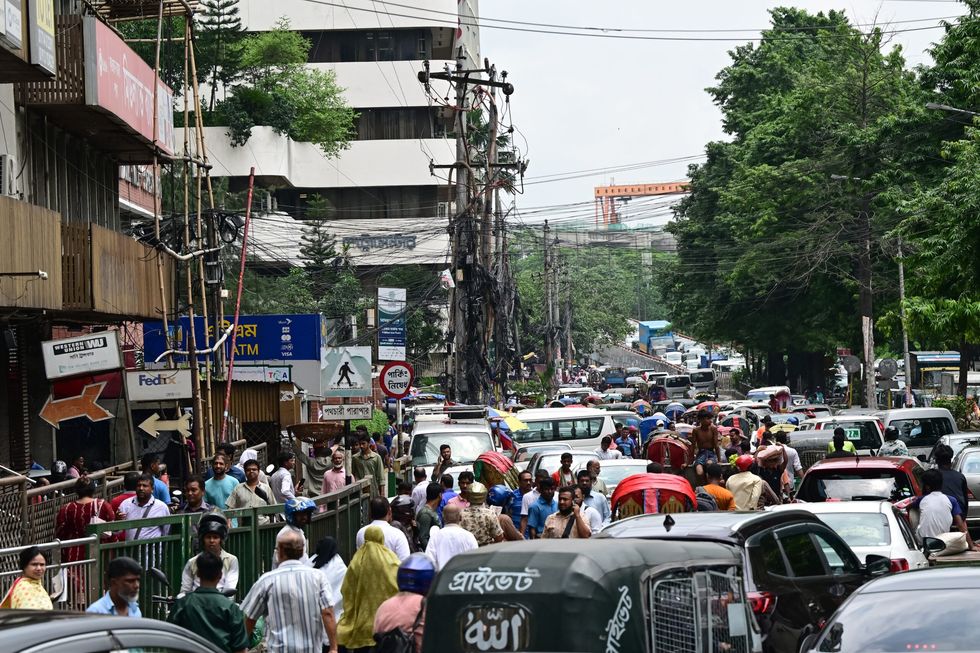Bangladesh further eased a nationwide curfew on Thursday as students weighed the future of their protest campaign against civil service hiring rules that sparked days of deadly unrest last week.
Last week's violence killed at least 191 people, including several police officers, according to an AFP count of victims reported by police and hospitals during some of the worst unrest of prime minister Sheikh Hasina's tenure.
Thousands of troops are still patrolling cities, and a nationwide internet shutdown remains largely in effect, but clashes have subsided since protest leaders announced a temporary halt to new demonstrations.
Hasina's government ordered another relaxation of the curfew it imposed at the height of the unrest, allowing free movement for seven hours between 10 am and 5 pm.
Streets in the capital Dhaka, a sprawling megacity of 20 million people, were choked with commuter traffic in the morning, days after ferocious clashes between police and protesters had left them almost deserted.
Banks, government offices, and the country's economically vital garment factories had already reopened on Wednesday (24) after being shuttered last week.
Rush-hour traffic returned to the capital Dhaka, and broadband internet was largely restored, although social media continued to be suspended after student-led protests turned violent last week.
"For now, all social media will remain shut," Zunaid Ahmed Palak, a junior technology minister, told reporters. He added that people might have to wait until Sunday (28) or Monday (29) to get mobile internet access.
As the curfew eased, the garment and textiles industries, which supply major Western brands, began reopening factories. "All our factories are open today. Everything is going smoothly," said S.M. Mannan, president of the Bangladesh Garment Manufacturers and Exporters Association.
Student leaders were set to meet later Thursday (25) to decide whether to extend their protest moratorium, which is due to expire on Friday.
Students Against Discrimination, the group responsible for organising this month's rallies, said it expected a number of concessions from the government.
"We demand an apology from Prime Minister Sheikh Hasina to the nation for the mass murder of students," Asif Mahmud, one of the group's coordinators, told AFP. "We also want the sacking of the home minister and education minister."
Mahmud added that the estimated toll in the unrest was understated, with his group working on its own list of confirmed deaths.
Police have arrested at least 2,500 people since the violence began last week, according to an AFP tally.
Protests began after the June reintroduction of a scheme reserving more than half of government jobs for certain candidates, including nearly a third for descendants of veterans from Bangladesh's independence war. With around 18 million young people in Bangladesh out of work, according to government figures, the move deeply upset graduates facing an acute jobs crisis.

Critics say the quota is used to stack public jobs with loyalists to Hasina's Awami League. The Supreme Court cut the number of reserved jobs but fell short of protesters' demands to scrap the quotas entirely.
Student protests give fresh impetus to Hasina's critics
Hasina, 76, has ruled the country since 2009 and won her fourth consecutive election in January after a vote without genuine opposition. Her government is also accused by rights groups of misusing state institutions to entrench its hold on power and stamp out dissent, including the extrajudicial killing of opposition activists.
Analysts say the student action has given fresh impetus to Hasina's critics, who accuse her of authoritarianism, months after she won a fourth-straight term in power in January in an election boycotted by the main opposition party.
"The informal federation of government critics appears deeper and wider than before the election, which presents a serious challenge to the ruling party," said Geoffrey Macdonald at the United States Institute of Peace.
Hasina is the daughter of Sheikh Mujibur Rahman, the founding father of Bangladesh, who led the country's movement for independence from Pakistan.
The earlier 56% job quotas included a 30% reservation for families of the independence fighters, which critics said favoured supporters of Hasina's Awami League. Hasina's government had scrapped the quotas in 2018, but a high court ruling reinstated them last month, which the government appealed to the Supreme Court.
The quotas left fewer than half of state jobs open on merit amid an unemployment crisis, particularly in the private sector, making government sector jobs with their regular wage hikes and perks especially prized.
Hasina has blamed her political opponents for the violence, and her government said on Tuesday it would heed the Supreme Court ruling. The main opposition Bangladesh Nationalist Party has denied any involvement in the violence and accused Hasina of cracking down on free speech and dissent, charges denied by her government.
Students have made four demands to the government with a deadline of Thursday, including the restoration of internet, withdrawal of police from campuses, lifting the curfew, and reopening universities shut since Wednesday. Student groups have not said what they plan to do if the demands are not met.
(With inputs from AFP and Reuters)




